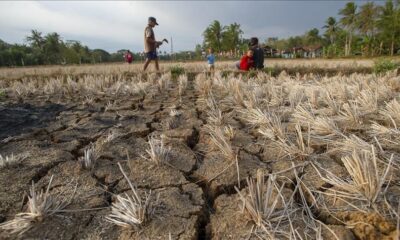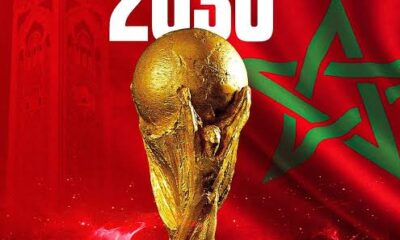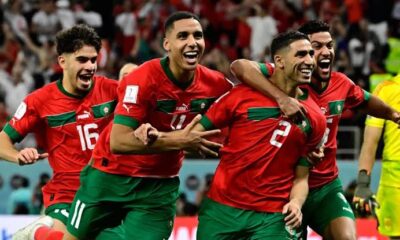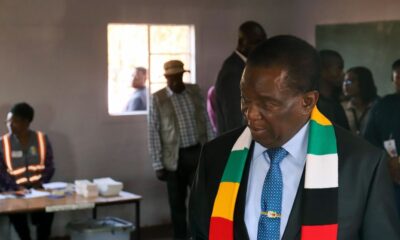Behind the News
Behind the News: All the backstories to our major news this week
Published
10 months agoon

Over the past week, there were many important stories from around the African continent, and we served you some of the most topical ones.
Here is a rundown of the backstories to some of the biggest news stories in Africa that we covered during the week:
Morocco in fresh culture reform
The week started with Morocco’s Ministry of Culture announcing that it has begun meetings with the National Foundation of Museums to discuss methods and practices to better police and detect forged paintings and artworks, including handing down harsher sentences and better regulating auction houses.
Later in the week, Moroccan activists began online campaigns demanding the return of a letter that dates back to the 18th century, which they see as an important part of the country’s history.
The historic letter was allegedly sent by Moroccan Sultan Moulay Ismail Ibn Sharif to Charles Stewart of the United Kingdom in 1720. It is presently on display in Austria. The letter was reportedly a diplomatic communication delivered by the Sultan in December 1720 to Stewart, the English Ambassador leading a mission dispatched during King George I’s reign to negotiate peace with Morocco.
Over the years, culturally strong Morocco has been keen on the return of its artefacts scattered across the world; in 2021, Moroccan authorities received nearly 25,000 archaeological objects, which had been seized in France during three customs controls and which illustrate the “scourge” of looting of cultural property.
But Morocco’s claims of “cultural theft” are beyond tangibles. Historically, the country has also been in diplomatic tension, particularly with neighbouring Algeria, over the appropriation of some of its intangible cultural heritage as the practices, representations, expressions, knowledge, and skills that communities, groups, and individuals recognize as part of its cultural heritage. Adidas, a company that makes football uniforms, became embroiled in a dispute in 2022 between the two countries over a new national team design created for Algeria, which Moroccan officials claim amounts to cultural appropriation.
But the issues extend beyond Morocco; other African countries also have claims of illegal cultural engagement that amounts to theft, forgery and cultural appropriation. In some other instances, it is a case of “error of facts” around certain history similar to that which surfaced in 2023 over the Netflix docudrama “Cleopatra,” in which some Egyptian observers claimed the feature of the eponymous character was appropriating their culture and rewriting their history, primarily because Cleopatra is portrayed by a black woman in the film.
Perhaps Morocco’s latest drive for “cultural policing” will pave the way for other African countries and provide a template to maximize the potential of Africa’s culture and art. It is curious to see if the controversies around cultural theft will ever end, with most countries on the continent being “colonial states” and some having a history of settlers.
Zimbabwe is considering another adventure for currency stability
The governor of Zimbabwe’s central bank announced on Wednesday that the bank and the finance ministry will be working together to devise fresh plans for stabilising the country’s currency. The decision was required because the Zimbabwean dollar in less than two months has dropped by over 40% since the start of the year due to lower commodity prices that have dampened inflows and increased demand for foreign currency from state employees earning December bonuses.
The planned collaboration will be the latest of many policy attempts to stabilize the Southern African economy. According to a study by Statista, “inflation in Zimbabwe rose to 10.61 percent in 2018 and is projected to jump dramatically to 577.21 percent in 2020. After that, estimates predict a slow decline for now; however, given Zimbabwe’s history of poor monetary policy, including one of the worst instances of hyperinflation, this seems unrealistic.” The current economic situation appears to have fulfilled Statista’s projection.
The country’s dark economic history can be traced to when the Economic Structural Adjustment Policy (ESAP), a policy of economic liberalisation that demolished a planned “siege” economy from the UDI era, was implemented in August 1991. The value of the currency started to decline sharply. Also, Zimbabwe’s involvement in the Second Congo War, the chaotic redistribution of land to unskilled farmers, and declining export revenues all contributed to the currency’s official and unofficial exchange rates plummeting further.
So bad did the situation turn that the Zimbabwean government announced on July 13, 2007 that it had temporarily stopped releasing official inflation data—an attempt observers say was to deflect attention from “runaway inflation, which symbolises the country’s unprecedented economic meltdown.” Also, in response to the currency’s declining value, the central bank favoured the printing of additional banknotes, which experts say compounded the issue.
Following years of price speculation and hyperinflation, general consumer prices began to stabilise in January 2009, when the use of foreign currencies became authorised. The Central Bank declared on January 29, 2014, that the following currencies would be recognised as legal tender in Zimbabwe: US dollars, South African rand, Botswana pula, pound sterling, Euro, Australian dollar, Chinese yuan (renminbi), Indian rupee, and Japanese yen.
It is yet to be seen what the likely new moves by the central bank and the finance ministry will be this time, as Zimbabweans hope that incumbent Emmerson Mnangagwa who was recently reelected, can turn things around, but a more critical point would be the sustainability of the reforms vis-à-vis lasting effects on the public after years of various quick fixes.
World Bank won’t budge over alleged sexual assault in Kenya’s IFC division
World Bank President Ajay Banga, for the umpteenth time, denied allegations that the organization’s International Finance Corp (IFC) unit tried to hide allegations of sexual assault at a chain of for-profit schools in Kenya that it controlled between 2013 and 2022. Banga took this position during a public event sponsored by the Centre for Global Development. When asked about the IFC’s response to an independent investigation into the claims at Bridge International Academies, Banga refuted the idea that the IFC was involved in a cover-up.
The International Finance Corporation (IFC) of the bank failed to meet its own environmental and social requirements prior to funding Bridge International Academies in 2014 and during its oversight of its investment in the project, which came to an end last year, according to the Compliance Advisor Ombudsman (CAO), the bank’s internal watchdog.
The CAO stated in a draft report in August that the company was aware of complaints of abuse but had not made sufficient efforts to address the cases or implement preventative measures to prevent abuse in the future. According to the CAO, between 2014 and 2021, it discovered 21 instances of teacher sexual abuse of minors at Bridge schools.
Bridge acknowledged that nine reports of child sexual abuse were made in 2016 at one of its schools. It claimed to have terminated the contracts of the teachers who had been accused of abuse, reported the occurrences to the police, provided the victims with psychiatric support, and communicated with the communities and parents of the affected children.
The scandal has continued to resurface despite the World Bank’s continued denial. Although Banga was not selected for the position of bank president at the time of the divestment, he will still have to cope with the fallout while trying to improve the lender’s operations.
Nigeria’s central bank under pressure as economic crisis deepens
Nigeria’s Central Bank Governor, Yemi Cardoso, appeared before the House of Representatives for the sectoral debate on Tuesday, as many of the lawmakers expressed dissatisfaction with the performance of the governor in handling the naira, which has been on a downward spiral in the past couple of months.
Alongside him were Wale Edun, the Coordinating Minister for the Economy and Minister of Finance; Atiku Bagudu, the Minister of Budget and National Planning; and Zacch Adedeji, the Chairman of the Federal Inland Revenue Service.
Nigeria is talking about receiving up to $1.5 billion in loans from the World Bank to help ease the chronic dollar shortage that has been a major factor in the sharp collapse of the naira. International investors have praised recent reforms, but they have also resulted in a sharp increase in living expenses. Last month, inflation reached a 27-year high of 28.9%, and the value of the naira fell by about 50% compared to the US dollar.
During his address to the House, Cardoso outlined the difficulties the naira is facing, particularly the demand from students studying abroad. According to Mr. Cardoso, Nigerians also spent $11.06 billion on medical travel during that time. Also, more than 100,000 students are presently enrolled in programmes abroad, he said, adding that between 2010 and 2020, Nigerian students expended $28.5 billion abroad.
The country anticipates that oil production will increase to 1.78 million barrels per day, up from 1.49 million barrels last month. This should support the government’s finances and stimulate the economy. Meanwhile, domestic crude refining is anticipated to start up again this year at the state-owned refinery in Port Harcourt and at the Dangote refinery in Lagos. This would help ease the currency crunch by lowering the amount of petrol imported.
You may like
-


Zimbabwe at risk of fresh dry season after El Nino, WFP warns
-


FIFA officially confirms Morocco 2030 World Cup co-host
-


FIFA Ranking: Morocco remains Africa’s best as Nigeria suffers big drop
-


Zimbabwe aims to reconnect to global finance at debt summit
-


Wafcon 2024 draw throws up interesting pairings
-


Morocco’s Mpox test gets African CDC endorsement
Behind the News
Behind the News: All the backstories to our major news this week
Published
2 months agoon
October 18, 2024
Over the past week, many important stories from around the African continent were published, and we served you some of the most topical ones.
Here is a rundown of the backstories to some of the biggest news in Africa that we covered during the week:
Another look at Africa’s debt crisis
Conversations around Africa’s public debt were on the table during the week as Achim Steiner, administrator of the United Nations Development Programme, stated on Monday that the world’s poorest countries were unable to meet sustainable development targets because they had to prioritise debt payments over investments.
Addressing a gathering in Hamburg, Steiner asserted that the world financial crisis was impeding countries’ ability to accomplish the objectives, which include eradicating hunger and poverty, increasing access to healthcare and education, providing sustainable energy, and protecting biodiversity.
Since the COVID-19 pandemic’s pervasive effects on economies, the majority of the continent’s nations have suffered with both internal and international debt; yet, few have achieved much in the fight for debt restructuring under the G20 framework.
Numerous African nations, including Egypt, Tunisia, Nigeria, Ghana, Zambia, and others, are struggling with significant foreign debt. Together with Zambia and Ghana, Ethiopia will be a part of a thorough restructuring known as the “Common Framework.”
At the opening ceremony of the annual African Union summit in Ethiopia last year, UN Secretary-General Antonio Guterres made the case for changes to the international financial system’s structure to better meet the requirements of developing nations.
Africa’s whole external governmental debt as of 2021 was 726.55 billion USD. The amount of foreign public debt increased from 696.69 billion dollars in comparison to the previous year.
Concerns are being raised by the rising debt levels in Africa, which could not only hinder economic growth but also make repayment nearly difficult for many of these nations. This begs an important question: When does debt stop being beneficial and instead start to negatively impact a nation’s economic performance?
Kenya remains committed to Haiti, but what does it stand to gain?
Kenya will support an international anti-gang effort in Haiti next month by dispatching an additional 600 police officers there. Haiti’s prime minister was in Kenya to expedite the deployment of the military.
At least eleven countries have pledged to send more than 2,900 soldiers to participate in the Multinational Security Support (MSS), led by Kenya.
Kenya, whose participation in international peacekeeping missions is longstanding, declared earlier this year that it would be deploying 1,000 police personnel, citing as a starting point its assistance to a bordering country.
Approximately 600,000 individuals have been internally displaced due to gang conflict, and hundreds of thousands of aspiring migrants have been deported back to Haiti, where approximately 5 million people are facing extreme famine. October marks the end of the mission’s first 12-month term. As gang violence worsened in 2022, Haiti turned for the first time to foreign assistance.
Nevertheless, it failed to identify a leader prepared to assume the helm and numerous foreign governments were reluctant to back the unelected administration in the desperately poor nation.
Kenya gains significant political value by sending its troops to Haiti on the international scene. Kenya has gained international recognition as a trustworthy ally that is eager to assist other nations. The mission opens up various opportunities. Prior to deployment, Kenyan law enforcement forces will receive specialist training and equipment. In the long term, this will increase the force’s capacity. Of course, there are monetary rewards as the participating nations receive allocations of resources. Because troops will receive additional pay, officers are very interested in being deployed overseas.
Cameroon: ‘Healthy’ Biya remains out of sight
Cameroon’s president, Paul Biya can now be likened to the proverbial cat with nine lives as the 91-year-old has remained “healthy” following latest reports of his death during the week. Rumours have been circulating about Cameroonian President Paul Biya’s possible death in a military hospital in France due to his extended absence. This rumour stems from Biya’s prolonged absence following the September China-Africa Summit when he was anticipated to head back to Cameroon almost away.
As of November 6, 1982, Biya, who is 91 years old, has been in office for 42 years. He is the oldest head of state in Africa, the longest-lasting non-royal national leader worldwide, and the second-longest serving president overall. According to rumours, Biya’s oldest son Franck Emmanuel Biya may be named as his replacement for “continuity” in France.
Since its political independence from France and Britain in the early 1960s, Cameroon has only had two presidents. The country is currently dealing with two serious crises: a deadly Boko Haram insurgency in the north and a separatist conflict that has claimed thousands of lives.
President Biya is one of several long-serving African leaders, including Yoweri Museveni of Uganda, who has been in office since 1982, and Teodoro Obiang Nguema Mbasogo of Equatorial Guinea, Rwanda’s Paul Kagame is also gradually evolving into the group.
Things get tougher for embattled Kenyan Deputy President
During the week, the deputy president of Kenya was impeached by the National Assembly due to charges of corruption and abuse of power. In a vote held Tuesday night, lawmakers decisively decided to remove Rigathi Gachagua from office. The Senate will now decide what will happen to the deputy president.
Parliament adopted a proposal to remove Kenya’s deputy president from office, and on Wednesday, the matter was brought to the Senate for consideration. The National Assembly heard a nearly ninety-minute defence of troubled deputy president Rigathi Gachagua and his allies prior to the vote.
A surge of protests targeting President Ruto’s government has been occurring in Kenya over the last four months due to accusations of corruption made by certain lawmakers and government officials. High taxation and the parliament’s purported inability to act independently of the president were other issues that Kenyans objected to. Gachagua refutes the accusations made by certain lawmakers, who claim that the deputy president assisted in planning rallies against the government.
He supported Ruto in his election victory in 2022 and assisted in obtaining a sizable portion of the vote from the populated central Kenya region. Gachagua, however, has mentioned feeling marginalised in recent months, despite extensive claims in the local media that he and Ruto have strained political ties.
After widespread protests over unpopular tax increases in June and July that claimed more than 50 lives, Ruto sacked the majority of his cabinet and appointed members of the main opposition.
Gachagua infuriated many in Ruto’s coalition by comparing the government to a business and implying that people who supported the coalition had first claim to development projects and jobs in the public sector. Ruto has not yet publicly commented on the impeachment proceedings.
Behind the News
Behind the News: All the backstories to our major news this week
Published
3 months agoon
October 3, 2024
Over the past week, many important stories from around the African continent have been published, and we have served you some of the most topical ones.
Here is a rundown of the backstories of some of the biggest news in Africa that we covered during the week:
Musings on CBN rates across Africa: Ghana, Nigeria, and South Africa
During the week, many African countries announced monetary policy decisions. The Central Bank of Nigeria decided unanimously on Tuesday to raise its benchmark interest rate by an additional 50 basis points, to a new record high of 27.25%. This is the sixth hike in a row this year. The decision was made in an effort to reduce inflation, strengthen the naira, and draw in capital. Governor Olayemi Cardoso reaffirmed the bank’s commitment to controlling inflation and underlined how several rate hikes have contributed to its moderation.
Nigeria’s West Africa neighbour followed suit on Friday as the Bank of Ghana reduced its benchmark monetary policy rate by 200 points to 27% at a normal meeting. With inflation having slowed and disinflationary pressures mounting, this is the first decline in eight months and the steepest since March 2018. August 2024 saw a fifth consecutive month of decline in Ghana’s annual consumer inflation, which was still much higher than the central bank’s medium-term target range of 6% to 10%. The country’s annual inflation rate dropped to a nearly two-and-a-half-year low of 20.4% from 20.9% in July.
A week prior, as anticipated, the South African Reserve Bank decreased its benchmark interest rate by 25 basis points to 8% after holding seven consecutive meetings at a 15-year high of 8.25%. As price pressures decreased, the SARB is loosening policy for the first time since the epidemic in 2020
As monetary varying shifts across the continent continue, African nations are still facing numerous severe shocks and significant structural challenges, such as rising food and energy prices brought on by geopolitical tensions like Russia’s invasion of Ukraine, climate issues that impact agriculture and energy production, and ongoing political instability.
Africa’s real GDP growth slowed to 3.1% in 2023 from 4.1% in 2022 as a result of this difficult climate. With growth predicted to reach 3.7% in 2024 and 4.3% in 2025, the economic picture is projected to improve going ahead, underscoring the resilience of African countries.
Zambia and its post-drought plans
Zambia’s finance minister, Situmbeko Musokotwane stated on Friday that the nation intends to quickly recover from its worst drought in living memory and cut its budget deficit in half the following year.
The minister stated in a budget address that the copper producer hopes for a 6.6% growth in 2025, as opposed to a projected 2.3% increase in 2024. The country is aiming for a speedy recovery. as the government crop assessment data shows that over nine million people are affected in 84 of the 117 districts after suffering through the driest farming season in over forty years, which has led to considerable crop losses, an increase in livestock deaths, and worsening poverty,
Real GDP increased gradually between 2022 and 2023, from 5.2% to 5.8%. The supply side was driven by mining and quarrying, wholesale and retail commerce, and agriculture; the demand side was driven by consumer and business spending. Food prices, transit expenses, and the nominal exchange rate are the key drivers of inflation, which is expected to remain elevated and reach 11.0% and 10.9% at the end of 2022 and 2023, respectively.
The economic challenges faced by Zambia are exacerbated by the drought, especially when considering its debt load. Its debt restructuring talks under the G20 Common Framework have progressed far more slowly than was originally anticipated when the Common Framework was first proposed.
In 2017, Zambia was placed under debt distress, and as a result, non-concessional lending from multilateral development banks was discontinued. It’s possible that by overestimating sovereign risks, the main credit rating firms exacerbated the debt crisis and dealing with a post-drought crisis might just be another “too high hurdle”
As the World Bank and Uganda LGBTQ saga continues
The World Bank is taking more action in support of Uganda’s LGBTQ community. The global lender announced on Wednesday that it is implementing steps to guarantee that lenders to Uganda are not subjected to discrimination due to a severe anti-gay law. According to a World Bank representative, both new and continuing projects would be subject to the procedures, which also include an impartial monitoring system to guarantee compliance.
Same-sex partnerships are forbidden and punishable by life in prison; similarly, anyone convicted of “aggravated homosexuality” faces the death penalty. The Anti-Homosexuality Act (AHA) was passed by Uganda, a largely conservative nation, in May of last year and it has led to considerable Western censure and US penalties.
Other than Uganda, several African nations have strict laws that discriminate against individuals who identify as LGBTQ. Hakainde Hichilema, the president of Zambia, issued a warning in March to supporters of the LGBTQ movement to stop endorsing homosexuality. He also asked that Zambia “maintain laws that abhor alien orientations like gayism and lesbianism.”
South Africa, which has a constitution that forbids discrimination based on sexual orientation, was the first and only African nation to legalise same-sex marriage in 2006. Some African nations, such as Angola, Mozambique, Botswana, Lesotho, Mauritius, and Seychelles, have laws that are favourable to the continent’s population but Uganda appears to be unbothered or tempted despite the many causes and costs of its anti-gay stand.
Ahead of Tunisia’s presidential election
During the week, another Tunisian presidential candidate Ayachi Zammel was convicted and sentenced to six months imprisonment for using “fraudulent certificates” as opposition voices in the North African country continue on attack as President Saied positions himself for what is likely to be a reelection, as all but one of the opposition candidates are either incarcerated or have had their eligibility ruled invalid by the Tunisian electoral commission.
On September 19, a third candidate who had received the election commission’s approval was sentenced to 20 months in prison. Saied, who is currently running for reelection for a second five-year term, was originally elected in 2019 as an anti-establishment candidate who pledged to combat poverty and eradicate corruption. However, in 2021 he declared that he would rule by decree after overthrowing Mohamed Ennaceur and the elected parliament, a move denounced as a coup by the opposition and the international community.
Additionally, he has deployed more oppressive strategies, which may indicate that he is not confident in his ability to win with conviction. His severe actions could indicate a new stage in Tunisia’s democratic backsliding and foreshadow more crackdowns and turmoil during an inevitable second term.
Meanwhile, concerns exist over potential voting turnout as well. Under Saied, Tunisia has conducted three elections, with dismal voter turnout in each. Less than one-third of voters cast ballots in favour of a new constitution that solidified Saied’s power and overthrew the 2014 charter in July 2022. After Saied dismissed the previous legislature in December 2022, only 11% of voters cast ballots for new members of parliament, which is among the lowest turnout percentages ever recorded in a national election worldwide. The next December, Saied called elections for a new second house of parliament, repeating this dubious performance.
EDITOR’S PICK


DR Congo sues tech giant Apple over illegal mineral exploitation
The Democratic Republic of Congo (DRC), has filed a criminal case against the European subsidiaries of tech giant, Apple, accusing...


UNESCO lists Ghana’s Kente cloth as cultural heritage
The iconic Ghanaian Kente, a piece of clothing, has been recognized as a cultural heritage on UNESCO’s Representative List of...


Zambia: FOX report highlights persistent media harassment, calls for reforms
A new Freedom of Expression (FOX) report by the Media Institute for Southern Africa (MISA) Zambia, has raised concerns over...


Egyptian court upholds ex-presidential candidate Ahmed Tantawy’s sentence
Former presidential candidate, Ahmed Tantawy, and his campaign manager, Mohamed Abou El-Diar, were found guilty of faking election paperwork, and...


Court orders Uganda to compensate LRA war crimes victims
Uganda’s tribunal has ordered the government to pay up to 10 million Ugandan shillings ($2,740) to each victim of Lord’s...


Nigeria: 614,937 killed, 2.2m abducted in 1 year— Report
A new report released on Tuesday by the National Bureau of Statistics (NBS) has revealed that over 614,937 Nigerians were...


Seeking to expand ties in Africa, Indonesia’s Prabowo attends D-8 economic meeting in Egypt
According to the government, Indonesian President, Prabowo Subianto, travelled to Egypt on Tuesday to attend meetings of the D-8 Organisation...


M23 Angola peace talks break down as Congo, Rwanda dash hopes
Hopes of an agreement to end Congo’s M23 rebel conflict, which has displaced over 1.9 million people, were dashed when...


Nigeria obtains $600 million international loans for agriculture
To promote food security and rural development, the Nigerian government, through the Ministry of Agriculture and Food Security, has obtained...


Nigeria’s November inflation rate hits 34.60%
According to figures released by the statistics office on Monday, Nigeria’s inflation rate increased for the third consecutive month in...
Trending
-

 VenturesNow12 hours ago
VenturesNow12 hours agoNigeria’s November inflation rate hits 34.60%
-

 VenturesNow12 hours ago
VenturesNow12 hours agoNigeria obtains $600 million international loans for agriculture
-

 VenturesNow13 hours ago
VenturesNow13 hours agoIMF’s latest board reviews result in $182 million to Rwanda
-

 Politics12 hours ago
Politics12 hours agoGhana will not leave IMF but wants adjustments, says President-elect


